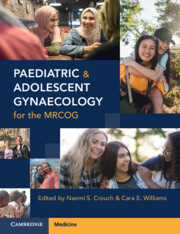Book contents
- Paediatric and Adolescent Gynaecology for the MRCOG
- Paediatric and Adolescent Gynaecology for the MRCOG
- Copyright page
- Contents
- Contributors
- Introduction
- Chapter 1 Embryological Development of the Internal and External Female Genitalia
- Chapter 2 Gynaecological History and Examination in Children and Adolescents
- Chapter 3 Normal and Precocious Puberty
- Chapter 4 Common Prepubertal Problems in Paediatric Gynaecology
- Chapter 5 Adolescent Menstrual Dysfunction
- Chapter 6 Polycystic Ovary Syndrome in Adolescence
- Chapter 7 Müllerian Duct Anomalies
- Chapter 8 Primary Amenorrhoea and Delayed Puberty
- Chapter 9 Rokitansky Syndrome
- Chapter 10 Turner Syndrome
- Chapter 11 Differences in Sex Development
- Chapter 12 Premature Ovarian Insufficiency
- Chapter 13 Gynaecological Laparoscopy in Adolescents
- Chapter 14 Psychology in Paediatric and Adolescent Gynaecology
- Chapter 15 Legal and Ethical Aspects of Paediatric and Adolescent Gynaecology
- Index
- References
Chapter 9 - Rokitansky Syndrome
Published online by Cambridge University Press: 28 January 2023
- Paediatric and Adolescent Gynaecology for the MRCOG
- Paediatric and Adolescent Gynaecology for the MRCOG
- Copyright page
- Contents
- Contributors
- Introduction
- Chapter 1 Embryological Development of the Internal and External Female Genitalia
- Chapter 2 Gynaecological History and Examination in Children and Adolescents
- Chapter 3 Normal and Precocious Puberty
- Chapter 4 Common Prepubertal Problems in Paediatric Gynaecology
- Chapter 5 Adolescent Menstrual Dysfunction
- Chapter 6 Polycystic Ovary Syndrome in Adolescence
- Chapter 7 Müllerian Duct Anomalies
- Chapter 8 Primary Amenorrhoea and Delayed Puberty
- Chapter 9 Rokitansky Syndrome
- Chapter 10 Turner Syndrome
- Chapter 11 Differences in Sex Development
- Chapter 12 Premature Ovarian Insufficiency
- Chapter 13 Gynaecological Laparoscopy in Adolescents
- Chapter 14 Psychology in Paediatric and Adolescent Gynaecology
- Chapter 15 Legal and Ethical Aspects of Paediatric and Adolescent Gynaecology
- Index
- References
Summary
Rokitansky syndrome, or Mayer–Rokitansky–Küster–Hauser syndrome (MRKH) also known as Müllerian agenesis results from embryonic underdevelopment of the Müllerian duct, resulting in agenesis or atresia of the uterus, vagina or both. The vagina is shortened and may appear as just a dimple inferior to the urethra. A single midline uterine remnant may be present, or there may be uterine horns (with or without an endometrial cavity) which do not communicate with the vagina. This condition belongs to the most severe (class 5) of the ESHRE/ESGE classification [1].
- Type
- Chapter
- Information
- Paediatric and Adolescent Gynaecology for the MRCOG , pp. 67 - 76Publisher: Cambridge University PressPrint publication year: 2023

